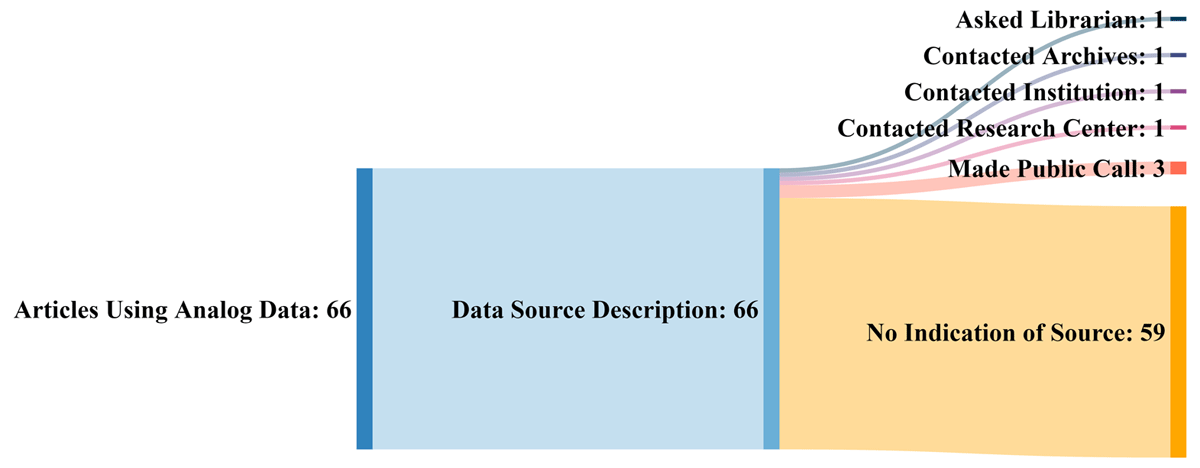Difference between revisions of "Template:Article of the week"
Shawndouglas (talk | contribs) (Updated article of the week text) |
Shawndouglas (talk | contribs) (Updated article of the week text) |
||
| Line 1: | Line 1: | ||
<div style="float: left; margin: 0.5em 0.9em 0.4em 0em;">[[File: | <div style="float: left; margin: 0.5em 0.9em 0.4em 0em;">[[File:Fig1 Kelly DataSciJourn22 21.png|240px]]</div> | ||
'''"[[Journal: | '''"[[Journal:A critical literature review of historic scientific analog data: Uses, successes, and challenges|A critical literature review of historic scientific analog data: Uses, successes, and challenges]]"''' | ||
For years, scientists in fields from climate change to biodiversity to hydrology have used older data to address contemporary issues. Since the 1960s, researchers, recognizing the value of this data, have expressed concern about its [[Information management|management]] and potential for loss. No widespread solutions have emerged to address the myriad issues around its storage, access, and findability. This paper summarizes observations and concerns of researchers in various disciplines who have articulated problems associated with analog data and highlights examples of projects that have used historical data. The authors also examined selected papers to discover how researchers located historical data and how they used it. While many researchers are not producing huge amounts of analog data today, there are still large volumes of it that are at risk. To address this concern, the authors recommend the development of best practices for managing historic data ... ('''[[Journal:A critical literature review of historic scientific analog data: Uses, successes, and challenges|Full article...]]''')<br /> | |||
''Recently featured'': | ''Recently featured'': | ||
{{flowlist | | {{flowlist | | ||
* [[Journal:Data management of microscale reaction calorimeter using a modular open-source IoT platform|Data management of microscale reaction calorimeter using a modular open-source IoT platform]] | |||
* [[Journal:Integrative diagnostics: The time is now—a report from the International Society for Strategic Studies in Radiology|Integrative diagnostics: The time is now—a report from the International Society for Strategic Studies in Radiology]] | * [[Journal:Integrative diagnostics: The time is now—a report from the International Society for Strategic Studies in Radiology|Integrative diagnostics: The time is now—a report from the International Society for Strategic Studies in Radiology]] | ||
* [[Journal:Ten simple rules for maximizing the recommendations of the NIH data management and sharing plan|Ten simple rules for maximizing the recommendations of the NIH data management and sharing plan]] | * [[Journal:Ten simple rules for maximizing the recommendations of the NIH data management and sharing plan|Ten simple rules for maximizing the recommendations of the NIH data management and sharing plan]] | ||
}} | }} | ||
Revision as of 15:41, 21 August 2023
"A critical literature review of historic scientific analog data: Uses, successes, and challenges"
For years, scientists in fields from climate change to biodiversity to hydrology have used older data to address contemporary issues. Since the 1960s, researchers, recognizing the value of this data, have expressed concern about its management and potential for loss. No widespread solutions have emerged to address the myriad issues around its storage, access, and findability. This paper summarizes observations and concerns of researchers in various disciplines who have articulated problems associated with analog data and highlights examples of projects that have used historical data. The authors also examined selected papers to discover how researchers located historical data and how they used it. While many researchers are not producing huge amounts of analog data today, there are still large volumes of it that are at risk. To address this concern, the authors recommend the development of best practices for managing historic data ... (Full article...)
Recently featured:
- Data management of microscale reaction calorimeter using a modular open-source IoT platform
- Integrative diagnostics: The time is now—a report from the International Society for Strategic Studies in Radiology
- Ten simple rules for maximizing the recommendations of the NIH data management and sharing plan










